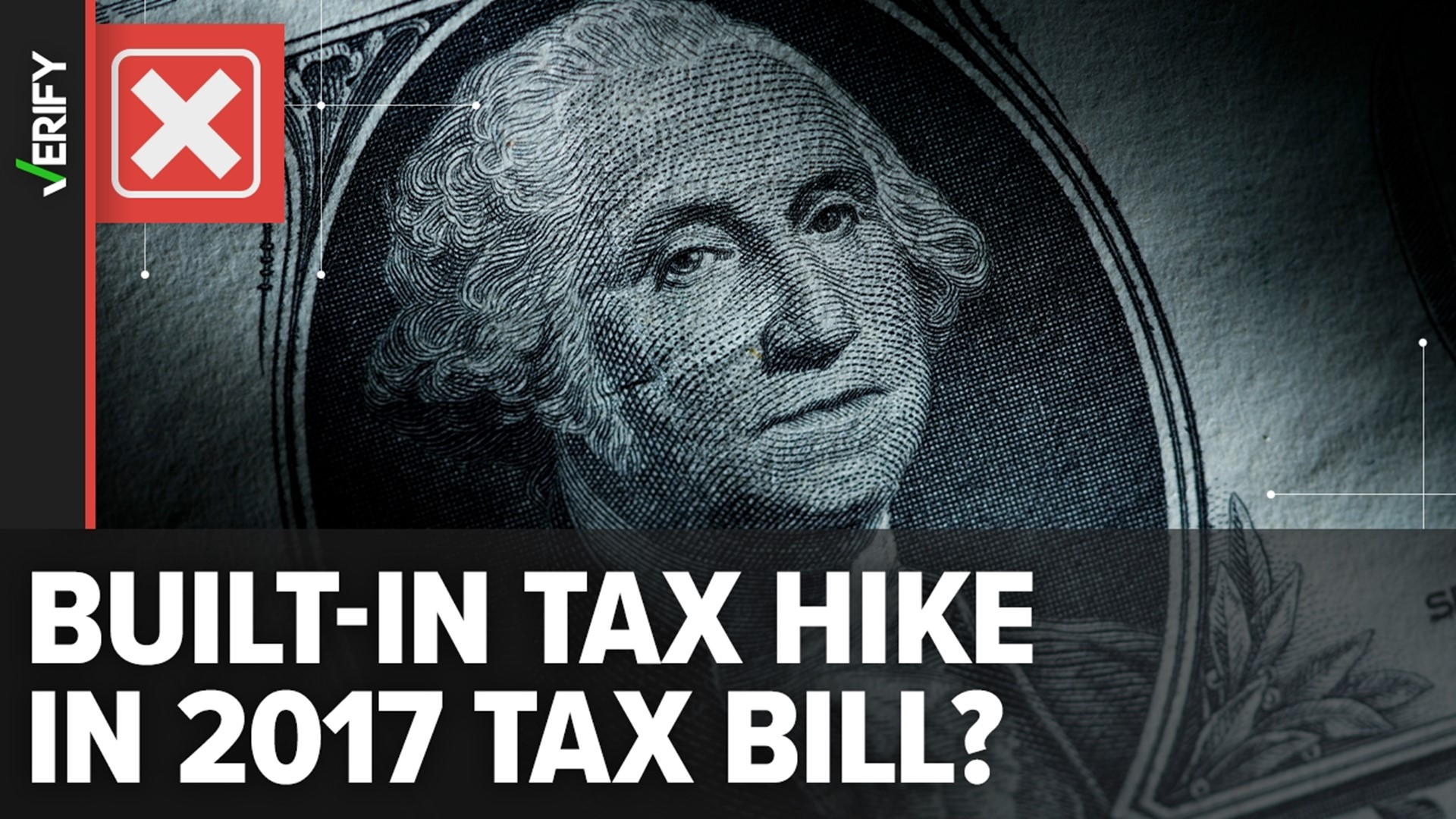Tax season is officially underway and some early filers are complaining online they owe more money to the IRS this year than anticipated.
Several social media posts that went viral on TikTok and X in January claimed the Tax Cuts and Jobs Act, a tax reform bill signed into law by then-President Donald Trump in 2017, is to blame for why it appears as if more people owe more federal income taxes this year.
One TikToker alleged there are yearly income-based tax increases built into the law, and those increases are hitting middle-class workers this year. But is that actually the case?
THE QUESTION
Does the Tax Cuts and Jobs Act of 2017 have built-in tax increases for 2023 taxes?
THE SOURCES
- Tax Cuts and Jobs Act of 2017
- Internal Revenue Service (IRS)
- Tax Foundation
- TaxAct, a tax preparation software company
- Howard Gleckman, senior fellow in the Urban-Brookings Tax Policy Center
- Tom O’Saben, director of tax content and government relations at the National Association of Tax Professionals
- Garrett Watson, senior policy analyst at the Tax Foundation
THE ANSWER
No, the Tax Cuts and Jobs Act of 2017 does not have built-in tax increases for 2023 taxes.
WHAT WE FOUND
All of our sources say the Tax Cuts and Jobs Act of 2017 is not to blame for why taxpayers may owe federal taxes this year because most individual income tax provisions in the law have not changed since 2018 and will not change until after 2025. VERIFY went through the law’s text and found it does not mention yearly income-based tax increases that will suddenly cause taxpayers to owe significantly more in taxes in 2023 versus last year.
The Tax Cuts and Jobs Act, which went into effect in 2018, overhauled the federal tax code by reforming individual and business taxes. Some of the major features of the law included lowering most individual income tax rates and increasing the standard deduction for single and married filers, according to the Tax Foundation. That means that for many people, the law actually lowered their federal taxes.
Most of the individual tax provisions in the law are set to expire on Dec. 31, 2025. After 2025, without specific action by Congress, tax rates, the standard deduction and other tax provisions will revert back to the laws in effect before the Tax Cuts and Jobs Act, according to the IRS.
“The Tax Cuts and Jobs Act has been in effect since 2018 and it’s not scheduled to make any changes until the end of 2025. It’s pretty much in place as it has been since it was first enacted under the Trump administration,” said Tom O’Saben, director of tax content and government relations at the National Association of Tax Professionals.
Garrett Watson, senior policy analyst at the Tax Foundation, agrees.
“The tax brackets and rates that changed in 2018 have not changed other than with inflation since then, and are not scheduled to change until the end of 2025. So it doesn’t have anything to do with the changes in rates and brackets,” Watson told VERIFY.
So why might some people owe the IRS more money this year?
“It’s more likely to do with an individual taxpayer’s tax situation shifting or the amount of withholding that they received than a tax hike from the federal tax rules,” Watson added.
VERIFY previously debunked similar misinformation related to the Tax Cuts and Jobs Act. In 2023, a viral video falsely claimed that taxes on the middle class would increase every two years until 2027 under the tax reform law. Tax experts we spoke with then also confirmed there were no scheduled tax rate increases written into the law.
“I think what we’re seeing now is there’s some, as we see every tax season, confusion about the difference between the refunds that taxpayers receive and the tax liability they actually are paying,” Watson said.
TaxAct says some of the most common reasons for owing taxes include having too little withheld from your paycheck, having additional income that is not subject to withholding, such as capital gains from stock sales or unemployment benefits, and changes in your tax return. For example, if your kids moved out and you’re no longer claiming them as dependents, or if you got a new job that pays significantly more than your previous one within the past year, you may owe taxes this year.
If you’re a taxpayer attempting to figure out why you owe money to the IRS this year, O’Saben and Watson both recommend reviewing last year’s income tax return to spot any potential changes from then to now. You can also contact a qualified tax professional for help.
“If a taxpayer is seeing an unexpected change in their tax situation based on their calculations and they’re unsure if it’s reflecting reality, it’s always great to get a second opinion,” Watson said.
If you’re unable to pay off your tax bill immediately, you can apply for a payment plan with the IRS to pay off your balance over time.

